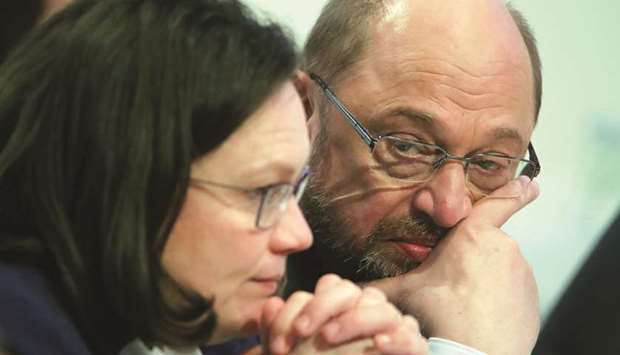As allies of SPD leader Martin Schulz tried to shut down an internal party debate about his role, Merkel allies pressured the Social Democrats to move quickly to conclude formal coalition negotiations – expected to begin on Friday.
Germany has been gripped by political deadlock since a September 24 national election.
The coalition negotiations promise to move Europe’s economic powerhouse closer to a stable government.
“After more than 100 days, the citizens of a democracy are entitled to the parties reaching an agreement,” said Andreas Scheuer, secretary general of Merkel’s Christian Social Union (CSU) Bavarian allies.
Volker Kauder, who leads conservatives in parliament, added: “Every day that passes without a new government does not exactly increase trust in the parties and democracy.”
Kauder called for a conclusion to the talks in two to three weeks.
For Merkel, a re-run of the conservative-SPD “grand coalition” that has governed Europe’s economic powerhouse since 2013 is her best shot at securing a fourth term as chancellor.
However Schulz is in a bind partly of his own making: he needs to deliver on a pledge to SPD delegates on Sunday to wring concessions out of Merkel – a mission made tougher by waning support for his centre-left party and questions about his role.
A survey by pollster INSA conducted on Monday, a day after the delegates’ vote, showed a dip in support for the SPD to 18% from 18.5%.
A new RTL poll conducted on Monday showed the party’s support had dropped a point to 17%.
The SPD is marred in an internal debate about its strategic direction after slumping in September’s election to its worst result since Germany became a federal republic in 1949.
Wolfgang Tiefensee, an SPD politician from the eastern state of Thuringia, said that Schulz should make clear that he will not serve as a minister in a cabinet led by Merkel – as he first said after September’s election.
Many in the SPD believe Schulz wants to be foreign minister.
“A 180° pivot on this issue would shatter the credibility of Martin Schulz,” Tiefensee told Die Welt newspaper.
Ralf Stegner, one of the SPD’s deputy leaders, shot back: “I think nothing at all of public proposals for the party leader.”
Adding to Schulz’s woes, mass-selling daily Bild said it was an impassioned speech to delegates on Sunday by the SPD’s parliamentary party leader, Andrea Nahles, that secured their 56% vote in favour of coalition negotiations.
“He knows: Andrea Nahles did his job,” Bild wrote.
Sunday’s narrow victory margin – and continued opposition by the party’s youth wing – puts pressure on Schulz to secure further concessions from conservatives on immigration, healthcare, and labour rights that conservatives have rejected.
The close SPD vote is also a problem for the conservatives because Schulz has promised that the SPD’s 443,000 members will be allowed to vote on a final deal.
If he fails to deliver for them, the whole coalition project risks collapsing.

